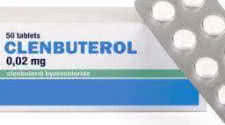Clenbuterol Drug: Combination of Steroids with Clenbuterol

Advanced Anabolic Drug Research & Side Effects Sciences
Clenbuterol is not an anabolic steroid. It's a beta-2 agonist drug, meaning that due to its structural similarity to epinephrine, it can interact with beta-2 adrenergic cell receptors in the body, as does epinephrine. In the lungs, activation of these receptors leads to dilation
of the bronchial tubes. Since asthma is characterized by a spasm of the bronchial tubes, leading to breathing difficulties, beta-2 drugs such as clenbuterol are given to treat asthma.
Clenbuterol, however, is an unusually Long-acting beta-2 drug, taking as long as two days to exit the body. This increased retention of the drug also increases the risk of side effects, explaining why the drug was never approved for use in the United States. It is available in other
countries, including Mexico, Germany, and Spain. Clenbuterol differs from many other drugs in its class because it appears to impart anabolic effects in muscle, along with a pronounced-though short term-thermogenic or fat-mobilizing effect. The fact that such effects have only been
confirmed in animal studies that featured doses of clenbuterol that would prove immediately toxic to humans hasn't deterred it from becoming a drug of choice for many athletes. But the side effects associated with clenbuterol relate to its similarity to epinephrine. These include
tremors, insomnia, muscle cramps, and possible adverse cardiovascular effects, the latter is highlighted in the case of a 26-year-old bodybuilder reported in the Southern Medical Journal, 1998;91:780-784.
This bodybuilder reported to a local medical clinic complaining of a dull chest pain that he had experienced for three hours. He had no risk factors for coronary artery disease, and previously had not had any health problems. He told the attending physicians that he was a competitive
bodybuilder, and that he was an anabolic steroid user for the past three years. Among the drugs he used were long-acting and short-acting testosterone injections, and oral Dianabol and Winstrol. Prior to showing up at the clinic, he had stopped using the steroids for a month, but
had begun taking clenbuterol. Since beginning the clenbuterol, he had noticed side effects consisting of heart palpitations, tremor, and nervousness for the past two weeks. The doctors then ordered a series of tests, which revealed that he had suffered a myocardial infarction
(heart attack) despite showing normal blood lipid levels and no apparent clogging of his coronary arteries. Most heart attacks are caused by a clot lodging in coronary arteries narrowed by atherosclerosis, but that wasn't the case here. He was later discharged from the hospital
with no further symptoms.
the doctors who wrote about this case suggest that since this bodybuilder showed none of the usual risk factors linked to heart attack onset, he probably had a spasm of his coronary arteries. This would have the same effect as if a clot had occluded the arteries, in that the heart
cells are deprived of oxygen, leading to the death of some heart cells-known as a myocardial infarction, or in common parlance, a heart attack. They suggest the relation between anabolic steroids and clenbuterol as the cause of this man's heart problems as follows: The steroids may
have caused cardiac hypertrophy (although this also occurs with normal, drug-free weight-training), or coronary artery spasm; or may have promoted the lodging of a clot (thrombus) in his coronary artery. Clenbuterol may have provided an additive effect through promoting increased
heart activity, or the anabolic effects of the drug may have also led to an enlargement in the heart size. Such an effect has been shown in rat studies of Clenbuterol.
On the other hand, even the authors of this report note that clenbuterol may not have had a "pathological" effect. But the fact that the bodybuilder was showing signs of clenbuterol toxicity two weeks prior to experiencing the heart attack led them to believe there may have been some
relation. Since Clenbuterol is known to stimulate the heart through an overlap effect on the adrenergic beta-i receptors (which would speed up the heart), this theory is not without some foundation.
Clenbuterol has been implicated in the death of at Least one well-known professional bodybuilder. However, since this man was taking several drugs at the time of his premature demise, it's hard to pinpoint any specific effect of clenbuterol. But one thing is certain: clenbuterol is
anything but innocuous. It does have the potential to cause serious side effects, and considering its brief duration of effectiveness, i.e., as little as 2-4 weeks, it's definitely not worth the risk for any rational person.